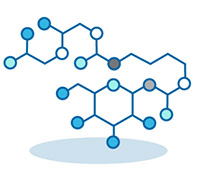Transplants

When cells survive, transplanted donor organs are more viable
Time seems to slow down when you’re waiting for a life-saving donor organ to become available. Then, when an organ is ready for transplant, you only have a very short window in which it is viable. With our research on AAGP®, we’re working to improve that window by extending the length of time an organ for transplant can survive and improving how well the new organ adapts to its new environment.Home / Applications / Transplants
The impact of AAGP®
Each day, about 80 people receive transplants, according to Health Resources and Services Administration. Currently, organs used in transplants can only survive for around four hours. With our proprietary anti-aging glycopeptide, AAGP®, we hope to extend organ viability to 24 hours.
We’re researching two major ways AAGP® can help: regenerative medicine and whole organ support, starting with a focus on tissue and organ replacements associated with diabetes.
Potential applications
- Islet cells for Type 1 diabetes
- Blood stem cells for cancer
- Cartilage for arthritis
- Retinal grafts for blindness
- Heart, liver, pancreas, or kidney transplants
Applications of AAGP® in Transplants

Type 1 Diabetes
In the U.S., more than 34 million adults — about 10% — have diabetes, which is a chronic condition that causes high blood sugar.
In Type 2 diabetes, the body doesn’t properly use insulin, causing dangerous swings in blood sugar levels. But in Type 1 diabetes, also known as juvenile diabetes, the body doesn’t make insulin at all. The resulting uncontrolled blood sugar levels can cause life-threatening complications, and people with this disease must take insulin every day in order to survive.

Research Pipeline for Transplants:
Regenerative medicine
Research:
Islet cells produce insulin, and Islet cell transplants are well recognized as a viable and effective treatment for unstable Type-1 diabetes. We are currently in Phase 1, first-in-human clinical trials to evaluate the safety and tolerability of AAGP® PKX-001 treated Islet cells. PKX-001 is the designation given to the lead drug product molecule of the AAGP® family for this application.
We are expanding Phase 1’s clinical trial to include testing on 10 patients. (This is in addition to the initial six patients.) The second half of Phase 1 will also include secondary objectives, including dose escalation to establish optimization criteria for efficacy testing. When Phase 2 begins, we’ll be evaluating the continued safety and efficacy of adding AAGP® PKX-001 treated islets to the already established Edmonton Protocol for the treatment of Type-1 diabetes. Stay up to date on the progress related to this protocol here.
Whole organ support
Research:
We are in the discovery phase of AAGP®’s effects on whole organ support. As we mentioned, we believe AAGP® has the power to extend the length of viability far beyond four hours for organs used in transplants.
One of the most significant complications of diabetes is blindness, often as a result of diabetic retinopathy. Protecting the retina is a challenge, and replacing it has been greatly limited by the number of available organ donors. Yet, developments through improved access to new retinas by use of a patient’s own induced pluripotent stem cells to make retinal grafts have emerged. Keeping these retina cells viable using AAGP is the hope of numerous patients and doctors. Protokinetix has advanced our pre-clinical studies to stage-3 and recently reported our findings.
We plan on testing the beneficial effects of our anti-aging glycopeptide being added to the perfusate solution. We feel that the addition of AAGP® to the irrigation fluid will protect and extend the viability of donor organs from harvest to transplant.
Our future work will expand to develop AAGP in concert with ongoing developments that support whole organs, such as the pancreas, heart, and liver, for transplantation. For example, normothermic liver perfusion is an innovative therapy applied to donor livers outside the body before transplantation. It improves the quality of the organ and makes it safer for transplant.
Explore other Industry applications for AAGP®
For investors
At ProtoKinetix, we calculate the market value of AAGP® in how well it can take care of patients. We want to help medical treatments become more successful in improving lives and helping cells survive. But we know that as an investor, you also want to know how our biotechnology can help you.
The 2025 market forecast for organ transplants is $51 billion. Investing in the future of medicine will help you and tens of thousands of people who receive transplants every year. The potential of our anti-aging glycopeptide is endless, and we’ve only seen the tip of the iceberg.
Research partners
Invest with us
ProtoKinetix has patented an anti-aging glycopeptide with the power to change lives through cell survival. The potential is endless, and we’ve only seen the tip of the iceberg. Get invested.
Research findings
Press releases
We’re already making headlines with our groundbreaking research on the impact AAGP® could have on transplant support.



